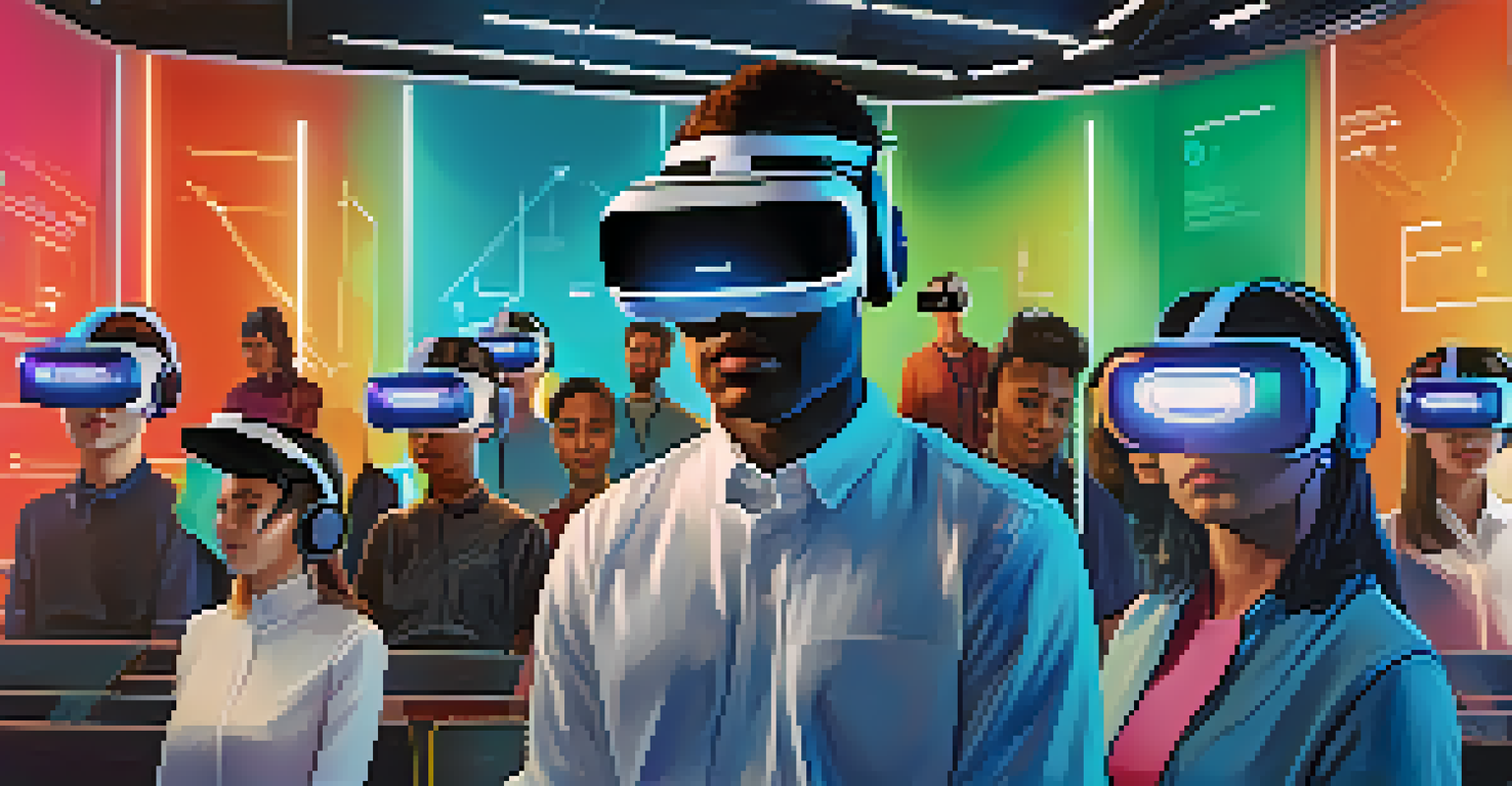The Role of Digital Assessment in Lifelong Learning

What is Digital Assessment and Its Importance?
Digital assessment refers to the use of technology to evaluate a learner's knowledge, skills, and competencies. It plays a crucial role in educational settings by providing timely feedback and personalized learning pathways. This form of assessment can take many shapes, including quizzes, interactive simulations, and e-portfolios, making it engaging and adaptable.
The greatest danger in times of turbulence is not the turbulence; it is to act with yesterday's logic.
In the context of lifelong learning, digital assessments are vital because they cater to diverse learning styles and allow for continuous skill development. As we navigate an ever-changing job market, individuals must consistently update their skills, and digital assessments make this process both efficient and accessible. By integrating technology into assessment, learners can track their progress in real-time.
Moreover, digital assessments often include analytics that help educators and learners identify areas for improvement. This data-driven approach not only enhances the learning experience but also ensures that educational resources are utilized effectively. In essence, digital assessments bridge the gap between traditional learning methods and modern needs.
Enhancing Accessibility Through Digital Assessments
One of the standout features of digital assessments is their ability to enhance accessibility for all learners. Traditional assessments often come with limitations, such as physical location or time constraints; however, digital assessments can be accessed anytime and anywhere, provided there is internet connectivity. This flexibility is particularly beneficial for adult learners juggling work and family commitments.

For individuals with disabilities, digital assessments can be designed to include various accessibility features, such as screen readers, alternative formats, and customizable interfaces. This ensures that everyone has the opportunity to demonstrate their skills and knowledge without unnecessary barriers. By prioritizing inclusivity, digital assessments foster a more equitable learning environment.
Digital Assessments Enhance Learning
Digital assessments provide timely feedback and personalized learning pathways, making them crucial in modern education.
Furthermore, the ability to offer assessments in multiple languages and formats can cater to a global audience. As lifelong learning becomes increasingly international, this adaptability ensures that learners from diverse backgrounds can engage with educational content that meets their needs. Overall, the accessibility provided by digital assessment is a game-changer in lifelong learning.
Personalized Learning Experiences with Digital Assessments
Digital assessments allow for a more personalized approach to learning, enabling learners to progress at their own pace. Unlike traditional assessments, which often follow a one-size-fits-all model, digital assessments can adapt in real time based on an individual's performance. This means that if a learner struggles with a particular concept, the assessment can provide additional resources or alternative questions to reinforce understanding.
Education is not the filling of a pail, but the lighting of a fire.
This level of customization not only keeps learners engaged but also helps them to build confidence in their abilities. For example, a learner who excels in math but struggles with writing can receive tailored assessments that focus on their weaker areas while still allowing them to showcase their strengths. Such an approach encourages a growth mindset, where learners view challenges as opportunities for improvement.
Additionally, the data collected from digital assessments can inform future educational strategies and interventions. Educators can analyze trends in performance to identify common challenges among learners, allowing them to adjust their teaching methods accordingly. This dynamic feedback loop ultimately enhances the overall effectiveness of lifelong learning initiatives.
Immediate Feedback: A Game Changer for Learners
One of the most significant advantages of digital assessments is the immediate feedback they provide. Unlike traditional assessments, which often require days or weeks for grading, digital assessments can give learners instant insights into their performance. This prompt feedback is crucial for motivation and helps learners to quickly identify areas needing improvement.
For example, if a learner takes an online quiz and receives instant results, they can immediately review the questions they missed and understand their mistakes. This level of interactivity encourages learners to engage more deeply with the material, making it easier to grasp complex concepts. Immediate feedback fosters a continuous learning loop that keeps learners motivated and invested in their education.
Accessibility is Key for Inclusivity
Digital assessments improve accessibility, allowing learners from diverse backgrounds to engage without barriers.
Moreover, educators can use this immediate feedback to adjust their teaching strategies on the fly, ensuring that they address any widespread confusion or difficulty. As a result, both learners and educators benefit from a more responsive and supportive educational experience. This adaptability is particularly valuable in the context of lifelong learning, where the ability to pivot and refine skills is essential.
Integrating Digital Assessments into Lifelong Learning Frameworks
To maximize the benefits of digital assessments, it's essential to integrate them into broader lifelong learning frameworks. This means aligning assessment practices with learning objectives, outcomes, and real-world applications. By doing so, digital assessments can provide learners with a comprehensive understanding of how their skills apply in various contexts.
For instance, organizations can use digital assessments not only to evaluate employee performance but also to identify skill gaps and provide targeted training opportunities. This strategic alignment ensures that assessments are relevant and contribute to the overall growth of individuals and organizations alike. Additionally, integrating assessments into professional development programs can enhance employee engagement and retention.
Furthermore, educational institutions can collaborate with industry partners to design assessments that reflect current job market demands. By aligning digital assessments with the skills employers seek, learners can be better prepared to navigate their career paths. Ultimately, the integration of digital assessments into lifelong learning frameworks creates a more cohesive and impactful educational experience.
Challenges and Considerations for Digital Assessments
While digital assessments offer numerous benefits, they also come with their own set of challenges. One major concern is the digital divide; not all learners have equal access to technology, which can create disparities in assessment outcomes. Ensuring that all learners can participate in digital assessments is crucial for fairness and equity.
Additionally, the reliability and validity of digital assessments can sometimes be questioned, particularly if they rely heavily on automated grading systems. It's essential to ensure that assessments are designed thoughtfully, taking into consideration the nuances of human learning and cognition. Educators and institutions must carefully evaluate their assessment strategies to maintain quality and rigor.
Immediate Feedback Boosts Engagement
The instant feedback from digital assessments keeps learners motivated and helps them quickly identify areas for improvement.
Lastly, there is the challenge of keeping assessments engaging and relevant. As technology evolves, so too do learners' expectations. To maintain interest and effectiveness, digital assessments must continually adapt to meet the changing needs of learners. Addressing these challenges requires ongoing dialogue and collaboration among educators, learners, and technology developers.
The Future of Digital Assessment in Lifelong Learning
Looking ahead, the future of digital assessments in lifelong learning is bright and filled with potential. As technology advances, we can expect even more innovative assessment formats, such as virtual reality simulations and gamified assessments that make learning enjoyable. These new methods can enhance engagement and retention, making learning experiences more impactful.
Moreover, the integration of artificial intelligence and machine learning into digital assessments could lead to even more personalized learning experiences. Imagine assessments that adapt not only to individual performance but also to learning preferences and styles, creating a truly tailored educational journey. This level of customization could revolutionize how we approach lifelong learning.

However, as we embrace these advancements, it's essential to remain focused on the core principles of education: accessibility, equity, and relevance. By prioritizing these values, we can ensure that the future of digital assessments enhances lifelong learning for everyone. The evolving landscape of education presents exciting opportunities for learners, educators, and organizations alike.